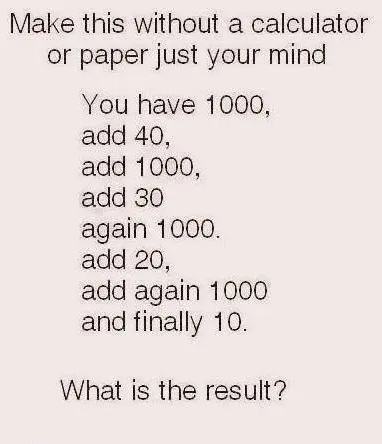
The Art of Mental Math
Mental math is more than just a party trick; it’s a skill that can sharpen your cognitive abilities and impress anyone. In an age where calculators and smartphones are always at our fingertips, the ability to solve complex problems in your head is a rare and valued talent. Today, we challenge you to tackle a mental math problem without any aids – just your brainpower.
The Challenge
Solve This Problem Using Only Your Mind
Here’s a mental math challenge designed to test your abilities:

If a train travels 60 miles per hour and departs at 3:00 PM, what time will it have traveled 180 miles?
Can you solve this without reaching for a calculator or jotting down notes? This problem tests not just your arithmetic skills but also your ability to visualize and manipulate numbers mentally.
Breaking Down the Problem
Understanding the Concept
To solve this problem, first understand the basic components:
- Speed: The train’s speed is 60 miles per hour.
- Distance: The total distance to be covered is 180 miles.
- Time: We need to determine how long it will take to cover this distance.
Calculating Time Required
Time = Distance ÷ Speed
Using the formula for time, which is distance divided by speed:
- Distance: 180 miles
- Speed: 60 miles per hour
The calculation is straightforward:
- 180 miles ÷ 60 miles per hour = 3 hours
Determining Arrival Time
Adding Time to the Departure
The train departs at 3:00 PM. To find out the arrival time:
- Departure Time: 3:00 PM
- Time to Travel: 3 hours
Simply add 3 hours to the departure time:
- 3:00 PM + 3 hours = 6:00 PM
The Solution
Arrival Time: 6:00 PM
The train will reach its destination at 6:00 PM. This exercise demonstrates the efficiency of mental math for solving practical problems quickly and accurately.
Why Mental Math Matters
Enhancing Cognitive Skills
Practicing mental math sharpens your problem-solving skills and enhances cognitive functions such as memory and concentration. It trains your brain to handle numerical information more efficiently and can be beneficial in everyday situations where quick calculations are needed.
Building Confidence
The Power of Mental Agility
Being proficient in mental math builds confidence. It allows you to tackle complex problems with ease and showcases your analytical capabilities. This skill is particularly useful in academic settings, professional environments, and everyday life.
Tips for Improving Mental Math Skills
Practice Regularly
Just like any skill, mental math improves with practice. Engage in exercises that challenge your numerical abilities and gradually increase the complexity of the problems you tackle.
Use Mental Math Strategies
Techniques to Enhance Speed and Accuracy
- Break Down Complex Problems: Simplify problems into smaller, more manageable parts.
- Practice Mental Calculations: Regularly work on mental addition, subtraction, multiplication, and division.
- Visualize Numbers: Picture the numbers and operations in your mind to better manipulate them.
Incorporating Mental Math into Daily Life
Practical Applications
Utilize mental math in everyday scenarios, such as calculating expenses, estimating travel times, or budgeting. Incorporating these practices into your daily routine helps reinforce your skills and makes mental math a natural part of your life.
Final Thoughts
Mastering mental math is not just about solving problems without tools; it’s about enhancing your cognitive abilities and building confidence. The challenge presented here is a simple yet effective way to test and improve your mental calculation skills. With regular practice and the right techniques, you can make mental math a powerful tool in your arsenal. So, the next time you face a mathematical challenge, remember that your brain is a powerful calculator – no external tools required!

